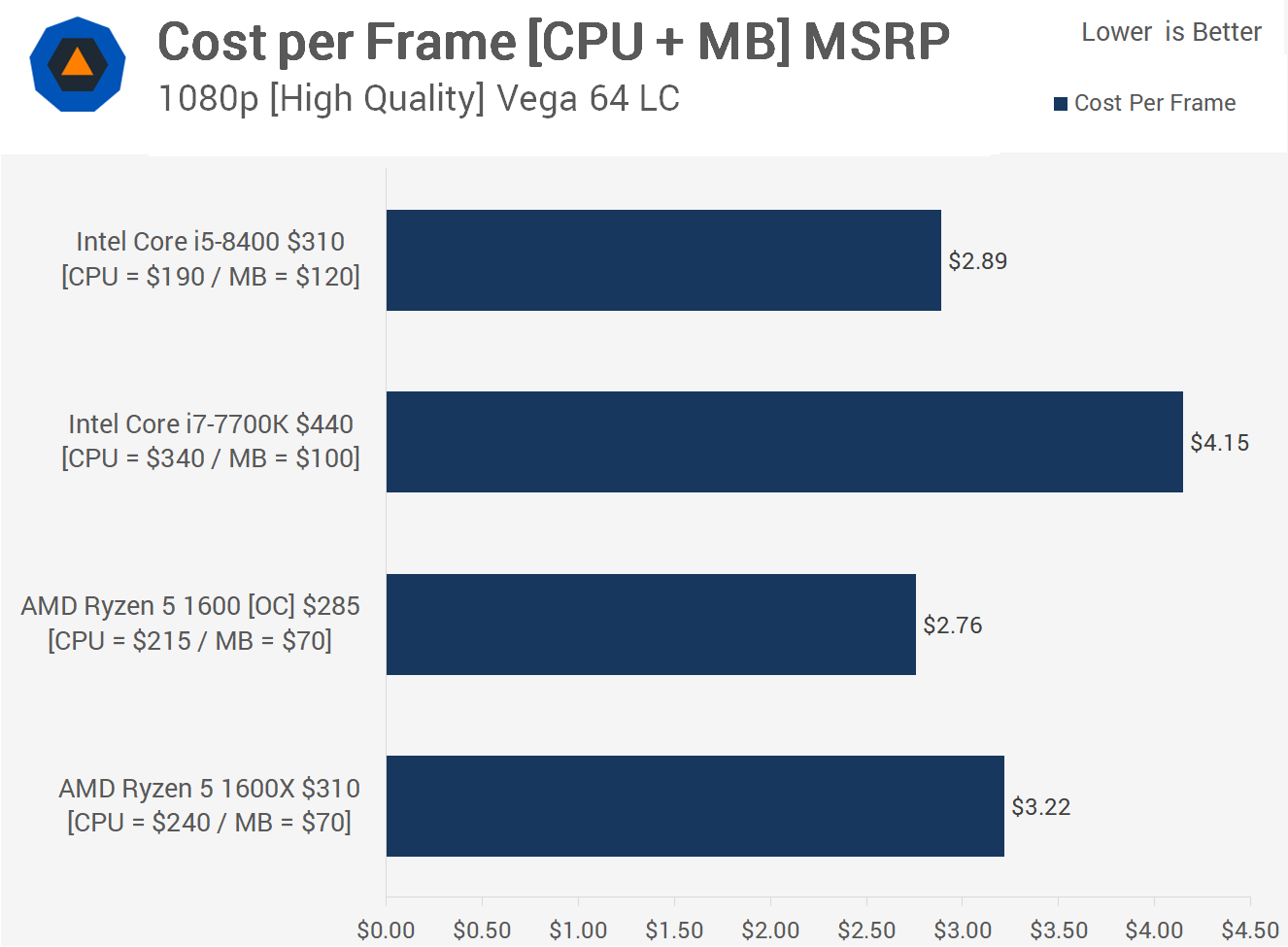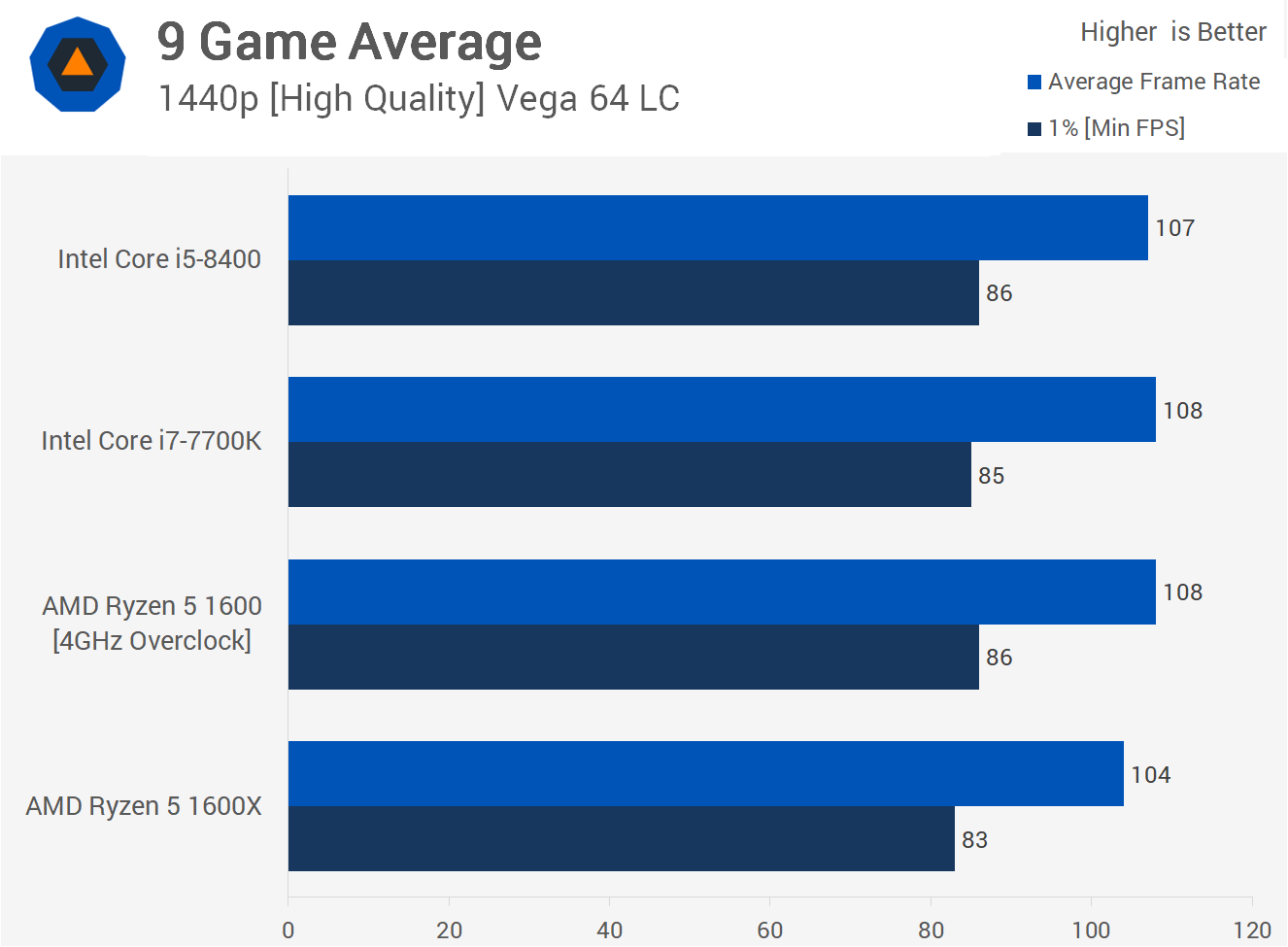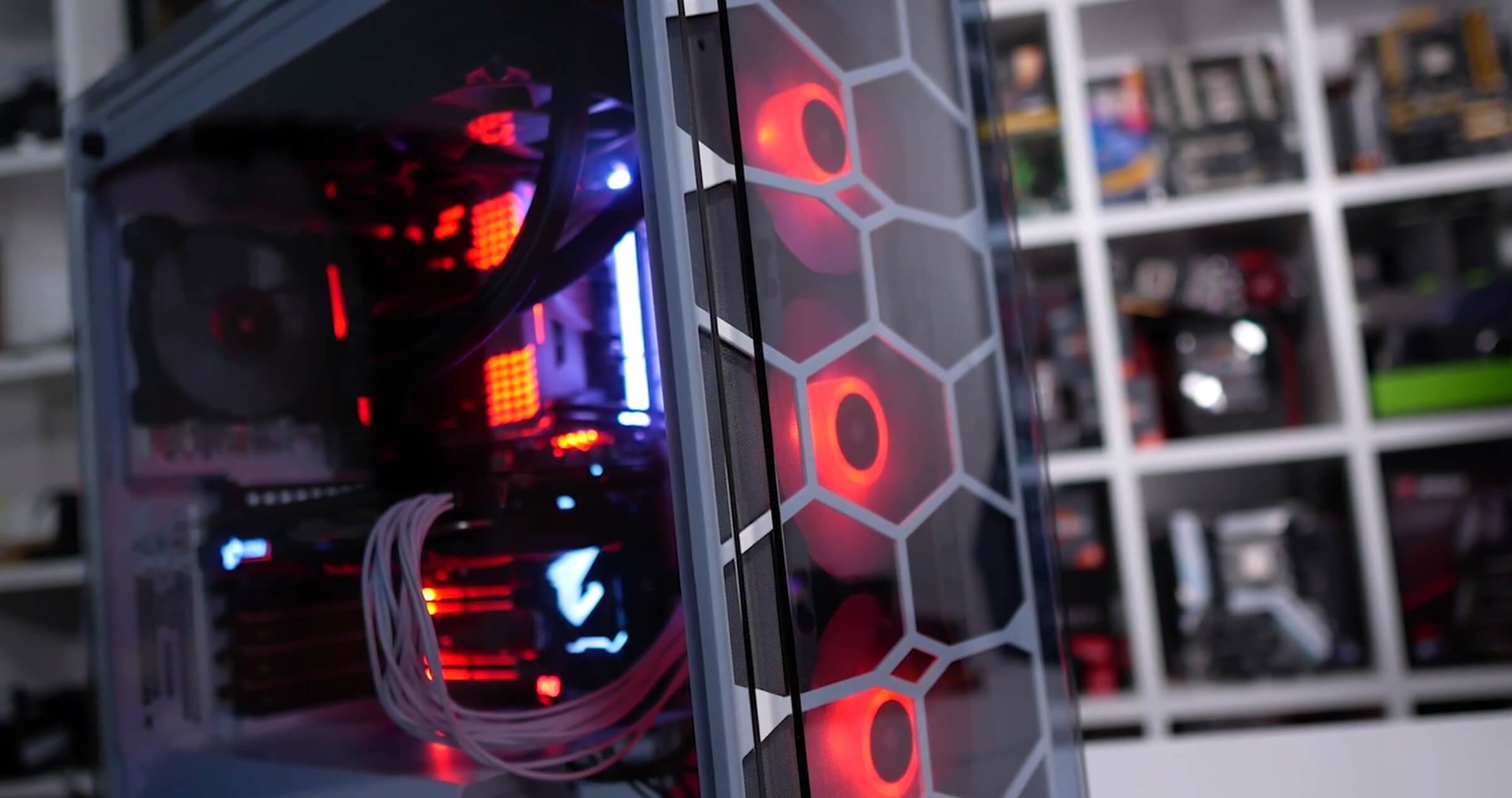Breaking Down the Data
First up, everyone's favorite... the 720p data. Here we can see the Core i5-8400 was 11% faster on average than the overclocked Ryzen 5 1600 when comparing the minimum frame rate. Not a massive margin but the 8400 is clearly faster overall. It's also worth noting that it matched the minimum result of the 7700K.

If we check out the cost per frame, this is what we find... (Please note I'm combining both the CPU and motherboard cost here, so the 8400 is paired with a cheap Z370 board and the R5 1600 with a B350 board. Both use the same memory, graphics card and all the rest of the hardware.)

Based on the 720p data of the Core i5-8400 combo, it actually ends up costing 2% less per frame than the competition despite costing 9% more thanks to its superior overall performance. That's not a huge difference of course so it's fair to say the 8400 and R5 1600 are similar in terms of value, assuming you're willing to overclock the Ryzen CPU.


Moving to 1080p we see that while the 8400 was 1% faster previously, it's now just 4% faster at 1080p. This means when comparing the price per frame, the 8400 now costs 5% more, making the overclocked Ryzen 5 1600 slightly better value.

At 1440p where we are heavily GPU-bound there is zero performance difference between the R5 1600 and 8400, which means the cost per frame of the 8400 is 9% more expensive as the combo costs 9% more, no surprises there.

Based on that data, the worst case for the Core i5-8400 is that it costs 9% more and delivers the same performance. That figure is just accounting for the CPU and motherboard, remember the Intel combo is just $25 more expensive. So those building a full system can safely add another $1,000 to the total and now the 8400 costs slightly less than 2% more.
What I'm getting at here is regardless of how you look at it, they're very similar. If we focus on non-GPU bound results which I feel we really ought to, the 8400 is the better value option as the performance increase outweighs the slight cost increase. At 1080p they're much of a muchness and naturally when GPU bound at 1440p the cheapest combo delivers the most value. The Core i3-8100 or Ryzen 3 1300X would win here if included so I'll let you decided on how much weight those 1440p results should carry.
Now I realize it's extremely difficult to buy the Core i5-8400 currently and getting one for $190 is even harder. However, this doesn't invalidate the results or my opinion. The MSRP is $182 and it won't be long before you can readily purchase the 8400 at around that price.
If this upsets you so much that you just can't get over it, think of it this way: You're getting a preview of what's to come. Intel will soon release the Core i5-8400 and this is how it will perform. Nothing about the performance data I've shown here will change and the 8400 will become available at around $190.
Armed with that information, you have a choice: take the red pill, or patiently wait for your pharmacy to restock the blue pill. That is to say, buy the Ryzen 5 1600 now or wait and get the Core i5-8400 once supply meets demand.
I know there's going to be AMD fans screaming that I'm biased because I included low resolution results or because I didn't base my pricing analysis on today's special at Microcenter. On the other side of that fence, Intel fans will be up in arms that I didn't use a GTX 1080 Ti for testing or that 1440p limits CPU performance and therefore AMD paid me.
The truth is, I don't care either way. Buy the Ryzen 5, buy the Core i5, it's all the same to me. I'm just trying to provide the best information I can on the subject for potential buyers. Just for fun though and something a little different, let's make a case for buying the Ryzen 5 1600 and then the Core i5-8400.
I'd consider buying the Ryzen 5 1600 because it's cheaper overall including platform costs and the savings could buy you a decent cooler or some flashy RGB lights. It's also available right now for the MSRP or a little less when on sale, and is supported by a massive range of affordable B350 motherboards. If you're using anything less than a GTX 1080 Ti or play at realistic resolutions the experience is going to be similar or identical to that of more expensive Intel CPUs.
The included cooler is good enough to support a 4GHz overclock with a custom fan curve and most chips hit at least 3.9GHz with the right voltage setting. Ryzen's efficiency is also great and the R5 1600 is rather power efficiency for a 6-core/12-thread CPU. Speaking of which, it does support 12-threads and that could be handy in the future. Gaming aside, the R5 1600 is the superior CPU for productivity even before it's overclocked (vastly superior in some tests).
And I'd consider buying the Core i5-8400 because it's the stronger gaming CPU for the vast majority of titles available right now. Stronger low resolution performance could point to it being a better CPU down the track and a better pairing for future generation GPUs. That said, a high refresh rate monitor will surely be better served by the 8400 right now. It's also a beast out of the box, no need to fine tune or overclock – not that you can, but you're getting superior performance in games anyway.
Although Z370 motherboards are the only option right now, going this route is only slightly more expensive and it provides a flexible upgrade path in the future, so it might not even be worth saving $30 to $50 on a B360 board for a lot of gamers. In the end, the 8400 is a simple, yet powerful option for gamers.
I'm trying to look at this as objectively as I can and you can certainly make a strong case for buying either the Ryzen 5 1600 or the Core i5-8400. The only hiccup is that you can actually buy the Ryzen CPU right now whereas you can't get the 8400. This is likely to change in the coming weeks however, so let's not complicate the issue. You'll just have to cross that bridge when it comes time to update or build your new gaming PC.
You have the performance data and you've seen how it translates when measuring the cost per frame based on the MSRP of each chip. If pricing is different in your region, take the average data and recalculate to determine the best value for you.
Shopping Shortcuts:
